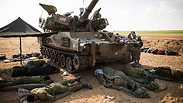
'Like in the Yom Kippur War, each side was able to present its desirable narrative'
צילום: gettyimages
Who really won the Gaza war?
Op-ed: In the Yom Kippur War, both sides' ability to claim victory paved the way to a peace agreement between Israel and Egypt. The outcome of Operation Protective Edge is different.
Did Israel win Operation Protective Edge? Was Hamas beaten? The history of the conflict between Israel and its enemies shows that the answers to these two questions do not depend on one another.
On the contrary, there is a possibility that both sides won or that both sides lost. We may only know the answer when the Cairo talks come to an end.
In the 50-day war between Israel and Hamas, both sides experienced ups and downs. In the first two weeks, Benjamin Netanyahu sought to end the violent conflict based on the "calm for calm" principle, but his appeals were rejected.
When the fire intensified and Hamas attempted to bring its attack tunnels into play, the Cabinet decided to "step up" its activities and launch a ground operation within the Gaza Strip, a move which Israel had preferred to avoid.
At the end of the fighting, Hamas was forced to give up on most of the demands it had presented as conditions for a ceasefire, including a seaport and an airport. The prime minister was right when he said that Hamas did not achieve a single one of its demands. But that is not the only criterion for determining who won the conflict.
In the Yom Kippur War, which lasted less than half the time of Protective Edge, the first week of fighting ended with the Egyptian and Syrian armies breaking through to Sinai and the Golan Heights, inflicting hundreds of losses on the IDF, shooting down one-third of the Israel Air Force's fleet – 80 planes – and destroying about 800 tanks.
At the end of the war, the IDF had positioned itself beyond the Suez Canal, on the main traffic artery on the way to Cairo, and our cannons were aimed at the suburbs of Damascus. The war ended with a clear Israeli victory, but that has not stopped Egypt from celebrating its victory in the "October War" every year.
Despite the IDF's dramatic and overwhelming victory, the government which led to this victory was forced to resign under the pressure of public opinion, which interpreted the final outcome of the battle differently.
Like in the Yom Kippur War, this time too each side was able to present its desirable narrative. There is no dispute that Hamas suffered a very serious military blow. About 1,000 of its fighters were killed, including its senior commanders.
But in the eyes of the Gazan sitting at the foot of his destroyed home, the images of the battle also include what is described as the flight of Israel's citizens from their homes along the Strip's border and the 36-hour suspension of much international traffic at Ben-Gurion Airport, after one rocket hit the city of Yehud.
Israel gave up in advance on its ultimate goal of destroying Hamas as a fighting body, although the war took place under excellent regional conditions and while the world was preoccupied with other conflicts.
Both sides' ability to claim victory with a certain amount of justice paved the way after the Yom Kippur War to the two leaderships – Israeli and Egyptian – to start a process that ended with a peace agreement. The outcome of Protective Edge is unlike the outcome of the Yom Kippur War: Hamas' failure is bigger than Egypt's failure in 1973, while Israel's abilities against Hamas are more significant than the abilities it had against Egypt and Syria in that war.
And there is another question, which is as important as the question who won: Had the prime minister known that the battle would last 50 days, and had he known its results – both the negative and positive – would he have behaved differently before the outbreak of Operation Protective Edge?
No one can provide a reliable answer to this question. But it should be considered even as moves are underway for another round to come sometime in the future, like a conditioned reflex.
After three indecisive rounds, it would be preferable to put some thought into searching for other alternatives rather than focusing only on the need to guarantee a better result next time. This is the difference between "the sword will devour forever" as a predestination and voluntarily choosing it.
Efraim Halevy is a former head of the Mossad.










